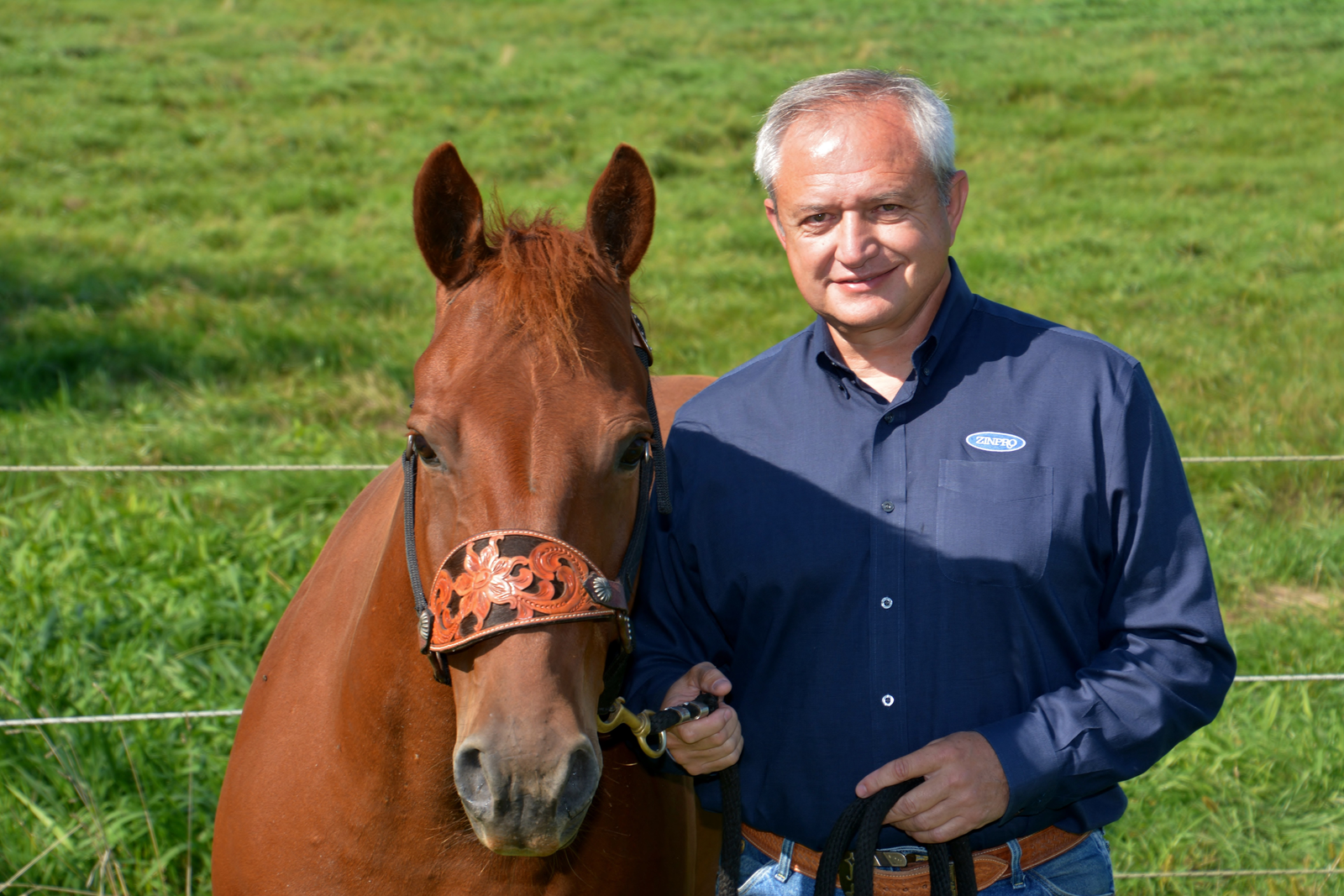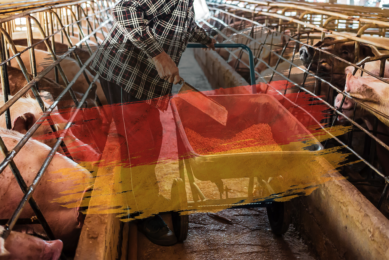“Global trends increase demand for performance enhancing diets”

All About Feed talked to Joseph Carrica, executive vice president of global sales & marketing at Zinpro Corporation, about the changing feed industry, the large number of new feed additives that have entered the market and the efforts Zinpro makes to anticipate and meet customer needs for animal nutrition performance solutions.
Joseph Carrica was born and raised in New Mexico, where his family owned and operated third generation beef cattle ranches. This is where his early interest in animal nutrition started. Prior to joining Zinpro, Carrica worked as a beef cattle nutritionist in Kansas, where he managed feedlot nutrition, product formulation and pricing for several feed mills, an experience that provided him with valuable animal nutrition consulting experience. Recently, he has seen the animal feed industry become bigger and more specialised. The need for sound research advice and high quality nutrients, such as specialty trace minerals, is therefore more pivotal than ever. Carrica believes that “the most expensive trace mineral product that you can feed is the one that doesn’t work”.
All About Feed: How has the feed additive business changed?
Joseph Carrica: “The feed additive business is growing, but at the same time getting much more competitive and more globally operated. The demand for certain animal feed additives, which provide growth and health benefits, has also increased in recent years, driven by a nearly worldwide global reduction in the practice of low-level antibiotics feeding for growth promotion. As a result, nutrition has become much more important over the last decade. Our goal is to keep the performance of the animals that are fed Zinpro products at a high level, regardless of the usage and level of pharmaceutical products in animal diets”.
This means many companies offer alternatives to antibiotic growth promoters?
“Yes, that’s true. There used to be only a few choices in the feed additive portfolio that a nutritionist could use in their animal feed formulations. Now there are many. One downside to the trend towards more feed additives on the market (of which many claim to be alternatives to antibiotic growth promoters) is a decline in scientific proof of performance. Many new feed additive products can show proof of product safety, but not necessarily proof of animal performance, hence no proof that there is a return on investment for the people raising these animals. I believe that this makes it much more difficult for animal nutritionists and the feed industry to decide which products to use”.
So, what is your strategy to stand out from the rest?
“Our main message is that we want to bring value to our customers by providing strong technical expertise, research-proven products and valuable educational tools and services to the industry. Research is an essential part of bringing value. The primary reason we invest so heavily in animal production research is two-fold. First and foremost, we honour a commitment to our customers (those who feed animals and those who control their nutrition) to prove that our products work and provide an economic return from their usage. Secondly, animal nutrition research is our primary way to distinguish our products. Another business concept that we have successfully launched into the animal feed market is our 5-Rs process for evaluating products. It is a concept that includes five criteria: Response (showing that the product works), Return (the economic return realised), Repeatability (verification through multiple studies and validating the repeatability of research), Research (based on high-quality, peer-reviewed, real-world production research parameters) and Reassurance (traceability and quality control of how our products are manufactured). These 5-Rs have helped the industry differentiate ordinary products from our Performance Minerals®. This is how we try to stand out.”

Name: Joseph Carrica Job title: Executive vice president, Global Sales & Marketing, Zinpro Corporation Bio: As executive vice president of global sales & marketing for Zinpro Corporation since 2012, Carrica oversees the company’s three sales divisions (Americas, International and North Asia) and the global marketing team. Carrica studied at New Mexico State University, receiving his master’s degree in animal nutrition and his bachelor’s degree in animal science. |
At the same time, use of minerals has been reduced in some countries due to environmental reasons.
“True, but we don’t see this as a threat to our business. All animals need to be fed trace minerals, and they need to be fed on a daily basis for optimal animal health. However, what is vital for animal health is not necessarily a high level of overall trace mineral usage. High levels have been used in some regions of the world, leading to environmental concerns as the residues might leak into the soil and hence ground water. One trace mineral fed at extremely high levels can also interfere with other ingredients in the diet. It is therefore important to aim for a proper mineral balance and a high quality of trace minerals being used. We continue to position our products around the world as a critical part of a well-balanced trace mineral programme, regardless of the total mineral limits imposed in different markets. This also fits our sustainability message, whereby animals are able to get superior mineral nutrition by consuming better quality trace minerals. Essentially, our customers can feed less mineral to obtain more performance per animal”.
Does this balanced feeding fit into the ‘precision feeding’ trend?
“The terms ‘modern animal feeding’ and ‘precision feeding’ are new terminology that we hear a lot about nowadays. And it is exciting indeed. The science in this area is growing rapidly, although the scale of the operation (farm) is important when you talk about precision feeding. Typically, integrators and all large-scale animal producers utilise or retain their own nutritional consulting and create precision-feeding programmes for their specific level of production, environment and market. For smaller farms, which often use an outside source to develop their feeding programme, it might be harder to have a precision feeding programme. At Zinpro, we look at precision feeding in a way that will balance trace mineral nutrition. This entails, for example, that we recommend to feed a combination of inorganic trace minerals, together with our unique, patented Performance Minerals. This combination ensures the best performance at a competitive cost in relation to the amount of mineral fed. We often work with many specific customers to develop customised feeding programmes for their own unique feeding operation”.
Does this mean your products are more expensive?
“There will always be cheaper products in the market, but I think the higher value product demand will grow as the industry is growing and is becoming more specialised. We do not focus on price points in the market but on creating value by inventing, producing, researching and then positioning our products to offer the best trace mineral nutrition programmes that meet the needs of our growing customers. There will always be less expensive minerals for sale on the market, and this will not change in the near future. Personally, I believe the old adage is still true today, ‘you get what you pay for’. At Zinpro, we believe that the most expensive trace mineral you can buy is the one that doesn’t work”.
What are the greatest challenges for a nutrition company such as Zinpro?
“I can think of two primary challenges for our company in the future. First is a more restrictive global regulatory environment that animal-food production will likely be facing. In many parts of the world, consumers are demanding nutritionally specific foods based on their own preferences. Parameters such as non-GMO, organic, all-natural, free-range, vegetarian, non-caged, will all affect how we will be feeding animals in the future. My personal bias is that the vast majority of people (consumers) know very little about how their food is produced, and many times our food production industry receives unwarranted negative perception and press. The second primary issue I see is the growing challenge to locate and hire the high-quality people for our industry that are driven to make careers in animal agriculture”.
Does this mean there is room to grow at Zinpro?
“Our company is highly focused on growth, but that means that we want to be the best, not necessarily the biggest. Our company has grown consistently for almost 50 years. In recent years, our growth has escalated as we have expanded our markets beyond North America. We are currently present in 70 different countries, which will grow with probably 2-3 more in the next year. We are focusing on the markets that have the strongest animal feed markets, which also means that we grow together with our customer base. In addition, we look at new (species) markets within the countries we are active in. In Europe, for example, we might want to be stronger in the poultry and swine markets, as we already have a strong presence in the dairy sector there. Our primary goal for growth is through internal innovation, product discovery and then value creation for our customers, which in turn creates sales and company profitability. From a business standpoint, we continually look into our markets and evaluate other corporate opportunities, but to-date we have been able to generate consistent positive growth from doing what we do best. From time to time, we entertain interest from other companies, and we will most likely continue to evaluate these opportunities. We are committed to only putting products into the market that truly work and provide performance and cost benefit to our customers.”











